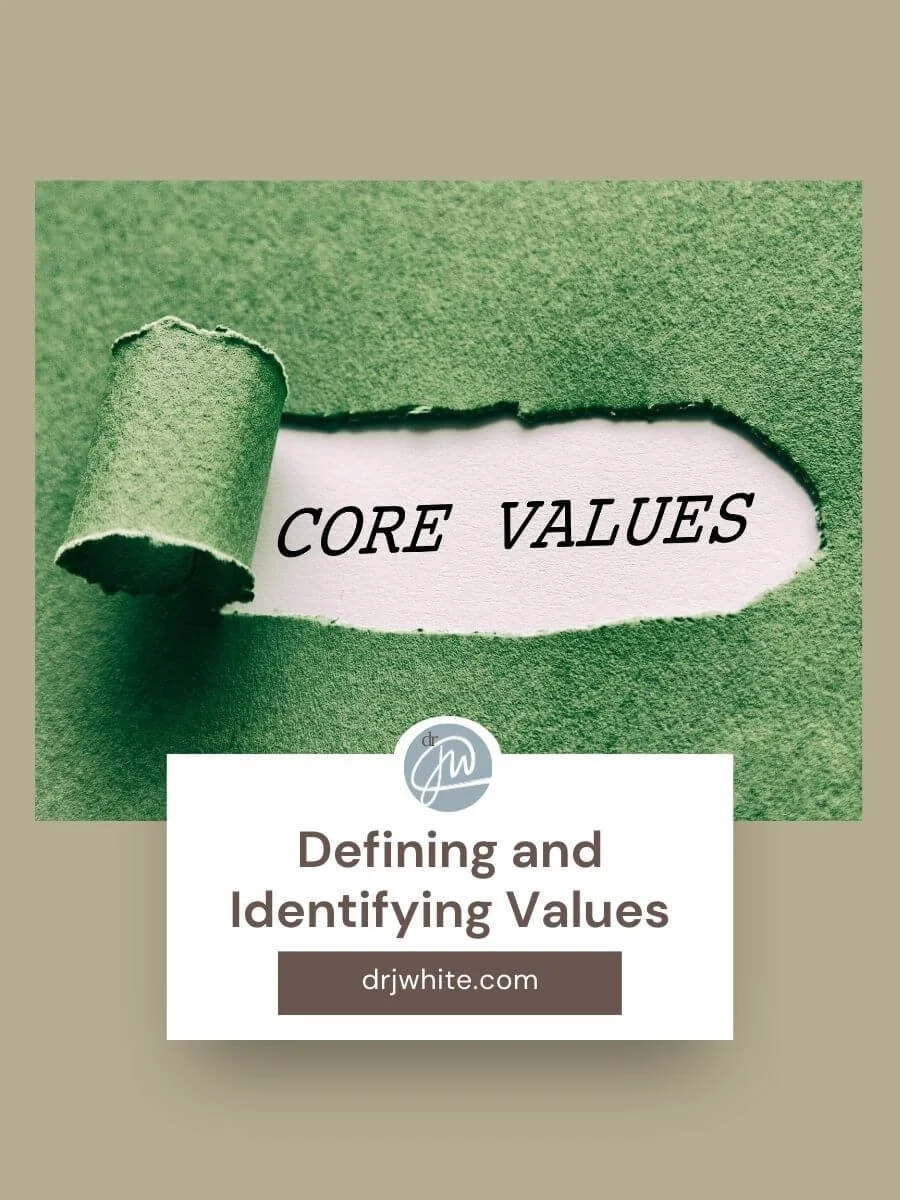Defining and Identifying Values
⏱️ Estimated reading time: 6 minutes
We all hit moments in life when we pause and wonder:
Am I living in a way that truly reflects what matters most to me?
Sometimes it’s during a transition, a tough decision, or even just a quiet Sunday afternoon. These natural pauses are invitations to reflect, not only on goals or achievements, but on the deeper question of values.
Most of us can rattle of a to-do list, but if I asked you to name your core values, could you do it? Taking time to clarify your values can be one of the most powerful steps you can make toward living with greater clarity, purpose, and alignment.
Before we dive in, I’m Dr. Jenny, licensed clinical psychologist who works with high-achievers, overthinkers, and people-pleasers who are tired of anxiety getting in their way. I offer virtual therapy across the Mid-Atlantic region so you can get support without sacrificing time driving to and from appointments. If stress, relationship struggles, or that loud inner critic keep showing up, I can help.
Let’s get back to talking about values since this is a key part of living authentically…
What is a Value?
A value is something that is meaningful to you because you choose for it to be. Not because someone else or society at large deems it to be important. This can be both very cool and very scary because it comes completely from within you. No one else can tell you what to choose. That freedom can be intimidating but it also means there is no wrong answer!
Keep in mind that since you get to choose these values, you do not have to justify them. They are important to you because they are. They cannot be right or wrong and are not a set of morals. They are simply ways of being that lead you toward the life you want to lead and the person you want to be.
The Difference Between a Goal and a Value
Goal
A goal is a finite thing. It can be measured and concretely achieved. Think about the definition of SMART goals (specific, measurable, achievable, reasonable, and timely). These are things that can be set specifically and it is very clear when you accomplish them. For example, a SMART goal might be “spend five minutes practicing mindfulness every day for one month.” If that is my goal, I can very clearly track my progress and I know when it’s finished.
Value
A value, on the other hand, is a quality of being and is ongoing. It is something in the here and now that you can do or be. It is a way of going about doing things. For example, a value might be “love” or “support” because you can behave in these ways. I can strive to always be loving or supportive in my relationships. Other examples could include “being caring,” “eating healthily,” or “communicating honestly.”
In this way, goals can help you along the way but are not values themselves. Consider the value of being healthy or eating healthily. Goals that might serve this value could be “eat three servings of fruits and vegetables with every meal” or “walk for at least 20 minutes every day.” See how it can work together cohesively?
Why Do Values Matter?
Knowing what is important to us can help us live richer, fuller, more meaningful lives. When we can identify our values we know what is of most importance to us and we can actively choose activities and behaviors that align. Values also act like a compass that can point us in a direction when we might otherwise feel indecisive or rudderless.
If we attempt to live our lives constantly making choices defined by what others say is important, we may just be going through the motions. We might end up feeling pretty unsatisfied, empty, unfulfilled, and even anxious. And we might not even realize why without taking the time to reflect on what matters, truly matters, to us as individuals. When we shift into taking our personal values into account, we can feel empowered and motivated. That can lead to taking even more action based on our values, which can feel pretty rewarding. Thus, greater meaning and purpose in our lives.
How to Identify Values
You might be asking yourself now, how do I even figure out what is important to me or what my values are? Here are a few places you can start.
Generally, you can reflect on some of the following questions:
What matters most to me?
What kind of person do I want to be?
How do I want to show up and interact in the world - with others, the environment, and myself?
Another helpful task is to break your life into several domains and think more specifically about what matters to you in each. Domains to consider might include: relationships (friends, family, intimate), work or school, leisure/fun/hobbies, and personal growth. You can get more specific but these can be a great place to start.
As you look at each domain, reflect on the following:
How important is this area of my life to me?
How do I want to show up in each of these areas?
How do I feel like I am doing currently in each area based on my answers to the first two questions?
Once you’ve done that, you might be able to review your answers and identify what they suggest is important to you.
Remember: There is No Right or Wrong
These are big questions that can feel hard or intimidating to answer. Remember, there is no way to get an A on the task of identifying your values. It isn’t about right and wrong. It is about reflecting on what is truly important so you can take action in that direction.
Get Your Free Values Activity
If you’re feeling overwhelmed and want someone to walk you through identifying your core personal values, I’ve created this free guide to do exactly that.
Summary / TL;DR
Defining your values helps create a clearer sense of purpose and direction. Unlike goals, values are ongoing qualities of being that guide your actions. By reflecting on what truly matters to you across different areas of life—like relationships, work, and personal growth—you can make more meaningful choices. Knowing your values can empower you to live a more fulfilling life aligned with your personal priorities, rather than external expectations. If you need support in identifying or acting on your values, seeking guidance can be helpful.
Work with Me
This can feel daunting and reflecting on these questions might bring up even more questions or some overwhelming emotions. You don’t have to do this work alone. If it feels like a lot, I encourage you to get support while doing it. I frequently talk with my clients about values, how to identify them, and how to take action on them. If you feel like I might be a good fit for you on this journey of exploring your values to create more meaning in your life - contact me here to get started.








